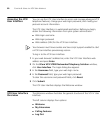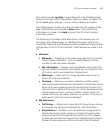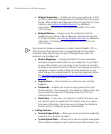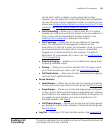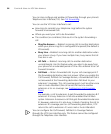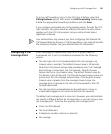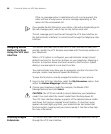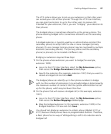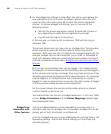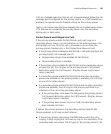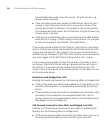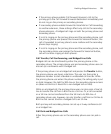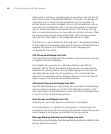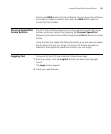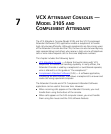
88 CHAPTER 6: USING THE VCX USER INTERFACE
3 For the bridged line settings to take effect, the phone must retrieve the
new settings from the VCX server. By default, phones check the VCX
server for new information every 60 minutes (the phone registration
interval). To retrieve bridged line settings, you can use one of the
following options:
■ Wait for the phone registration interval to expire (60 minutes or
less, depending on when the last registration occurred).
■ Log off and then log on to the phone.
In this example, an incoming call to extension 1000 will also ring on
extension 1001.
The primary phone user can make calls on a bridged line. The secondary
phone user can answer calls that are made to the primary phone’s
extension. Both users can use VCX features to manage bridged calls. For
example, bridged calls can be transferred, put on hold, or forwarded to
voice mail. However, because multiple phones are involved, you should
note the considerations discussed in Bridged Line Interaction with Other
Features.
Both primary and secondary users can be logged in to multiple phones.
For example, an administrative assistant (secondary user) can be logged in
to four phones and monitor a manager from any phone as long as all the
secondary phones are configured with the same extension. Or, a manager
may be logged in to multiple phones and monitored by an assistant
logged in to one or more phones. In any case, the total number of logged
in primary and secondary phones cannot exceed five.
For the current release, the primary and secondary phone (or phones)
must be located on the same site.
Your administrator can also set up bridged extensions. In this case, fields
on your Bridge Permissions and the Button Mappings tabbed pages
have preassigned values.
Bridged Line
Interaction with
Other Features
Calls to a bridged extension can be managed by a primary user or a
secondary user, like non-bridged calls. For example, bridged calls can be
parked, put on hold, transferred, or conferenced.
A call to a bridged extension can be affected by call coverage points, call
forwarding settings, and Do Not Disturb settings on the primary and
secondary phones.



